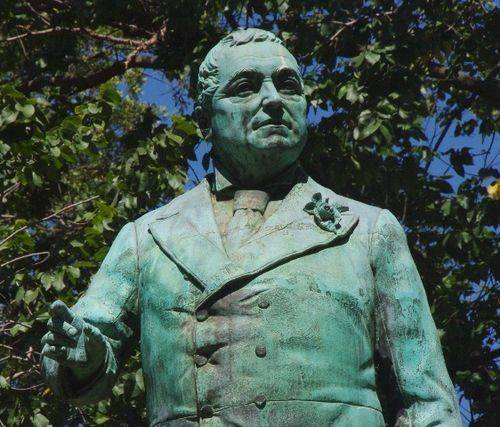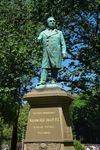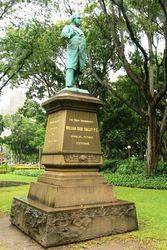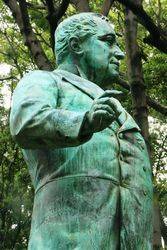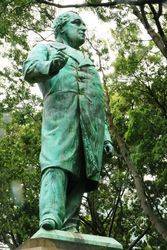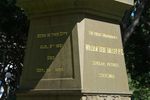
William Bede DalleyPrint Page 
The statue commemorates patriot, scholar and statesman, William Bede Dalley who died in 1888.
Virtually unknown in the early 1850s, William Bede Dalley's stirring street-corner speeches on the Constitution bill had thrust him into prominence while his natural geniality and generosity endeared him to most colonists. In 1856 at a banquet for C. G. Duffy he stamped his reputation as an orator by replying in place of Daniel Deniehy to the toast `Our Native Country`.
In December Dalley was nominated by Henry Parkes for the seat of Sydney, and won after stressing the rights of the native-born to an active political career. In parliament he supported the liberal policies of Charles Cowper and John Robertson, and introduced six public bills, including one to amend the licensing laws and one to abolish the death penalty for rape, but only his amendment, abolishing the religious test in the Affiliated Colleges Partial Endowment Act, was passed in 1858.
He also introduced six private bills, three of which were carried. To help Cowper in the 1858 elections he sacrificed his own chances for Sydney, but won Cumberland Boroughs. From November 1858 to February 1859 he was solicitor-general under Cowper.
The unveiling of the statue of the Right Hon. Wm. Bede Dalley, P.C., erected in Hyde-park, Sydney, was performed on Tuesday in the presence of a large concourse of spectators by His Excellency the Governor. Lord Hampden, who was accompanied by Lord Brassey and the Earl of Kilmorey, arrived at the site of the statue at 3 o'clock, and was received by Sir John Lackey, President of the Legislative Council, Mr Justice Manning, Mr. Justice A. H. Simpson, and a committee composed of the most representative citizens of Sydney.
The statue is of bronze, and rather larger than life-size. It is the work of Mr. J. White, a local sculptor, and is an excellent likeness of the deceased statesman, who is presented in the attitude of addressing an audience. The pedestal bears the inscription, '"The Right Honourable William Bede Dalley, scholar, patriot, statesman." The statue having been unveiled amid cheers, Professor Butler delivered an eulogium upon the deceased statesman, referring to the versatility of his abilities and the beauty of his personal qualities. Sir George Dibbs spoke concerning the political qualifications of the deceased, and mentioned that the Government had not contributed to the cost of the statue, the monument being entirely the outcome of the love and admiration of the people for one of their most distinguished statesmen. His Excellency the Governor, in responding to the vote of thanks passed to him for assisting at the ceremony, said that Mr. Dalley's prompt, patriotic, and statesmanlike action in sending a contingent to the Soudan had won the admiration of every Englishman who had watched the course of war there. As an Englishman, he had no doubt in his own mind as to the wisdom of the policy, for in offering the contingent Mr. Dalley had struck a note that had appealed to the racial instincts of the English-speaking people in every part of the world.
Albury Banner and Wodonga Express (NSW), 23 April 1897.
Location
| Address: | Prince Albert Road, Hyde Park, Sydney, 2000 |
|---|---|
| State: | NSW |
| Area: | AUS |
| GPS Coordinates: | Lat: -33.8704 Long: 151.212436 Note: GPS Coordinates are approximate. |
Details
| Monument Type: | Sculpture |
|---|---|
| Monument Theme: | People |
| Sub-Theme: | Government - Colonial |
| Artist: | James White |
| Link: | http://adbonline.anu.edu.au/adbonli… |
Dedication
| Actual Monument Dedication Date: | Tuesday 20th April, 1897 |
|---|
The Right Honourable
William Bede Dalley P.C
Scholar, Patriot,
Statesman.
Born in this city
August 5th 1831
Died Oct, 28th 1888.
Erected by public subscription
1897


